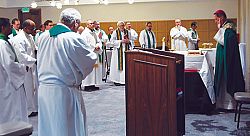Priests have four-day workshop on preaching

SALT LAKE CITY — The fall clergy convocation for the Diocese of Salt Lake City, held Oct. 11-14 at Homestead Resort in Midway, was dedicated to the topic of preaching.
That topic was chosen because the diocesan Pastoral Plan called for priests to have a workshop on preaching, said Fr. Martin Diaz, chairman of the diocese’s Board for the Ongoing Formation of Priests, who organized the convocation.
Retreat presenter Karla Bellinger, DMin. is the author of Connecting Pulpit and Pew: Breaking Open the Conversation about Catholic Preaching, and served as the associate director of the John S. Marten Program in Homiletics at the University of Notre Dame until last year. She recently became the founding executive director of the Institute for Homiletics at the University of Dallas, and is the current vice president and rising president (2022) of the Catholic Association of Teachers of Homiletics.
During the four-day convocation, Bellinger gave seven presentations. She did cover some of the basics of presenting a homily such as diction, gestures and pacing, but “most of her time was spent in how the homily is being received [by people in the pews],” Fr. Diaz said.
The overarching theme of the convocation was “Preaching for Encounter: How to Help People come into a Relationship with God,” and Bellinger gave ideas on how to do that, Fr. Diaz said. For example, the priests did exercises to learn how people listen and how to become better listeners.
“God needs heroic preachers who are willing to put their heart and soul into their preaching,” Bellinger told the priests.
As a preacher, a priest facilitates an encounter between his audience and God, she said. “You’re not making it happen. You’re helping people to come closer [to God].”
The fruits of such an encounter with Jesus can be a change of behavior, commitment to Church, and becoming a disciple, she said.
For a memorable homily, preachers should give concrete examples and use words people understand and images they relate to, she said. They also should appeal to people’s best selves, avoid preaching down to them, and include a message for people of all ages and both sexes, she said.
She urged the priests to talk about the work of Jesus. “If you yourself are on fire for what God has done and wants to do in these people’s lives, name it,” she said. “Because the people need it. … We have to get enthusiastic about how the Lord has touched our lives, how we would like the Lord to touch someone else’s life.”
Different people respond to different types of messages, she said; some react best to a story that touches their imagination, others to a logical argument, and still others like emotional appeals. Bellinger suggested the priests vary their homilies to engage different people in the audience.
However, “at least a third of your homily should be talking about the goodness of God, because our people in our country don’t know that,” she said. “Some of the older people do; the younger people have lost it because there’s so much noise coming at them about what will save them that they don’t know that God will save them.”
Fr. Diaz said he learned from Bellinger to structure his homily around verbs in Scripture readings, rather than nouns, which can mean different things to different people. For example, if a preacher speaks about a football game, it may be ambiguous as to whether he’s describing American football or soccer, “but shouting for your team to win is universal,” he said.
Bishop Oscar A. Solis said it was difficult to pick out one particular thing he learned from the presentations, but he became aware of the need for a priest to engage himself with the people. “You need to speak of God coming from your heart,” he said.
© Copyright 2025 The Diocese of Salt Lake City. All rights reserved.

Stay Connected With Us